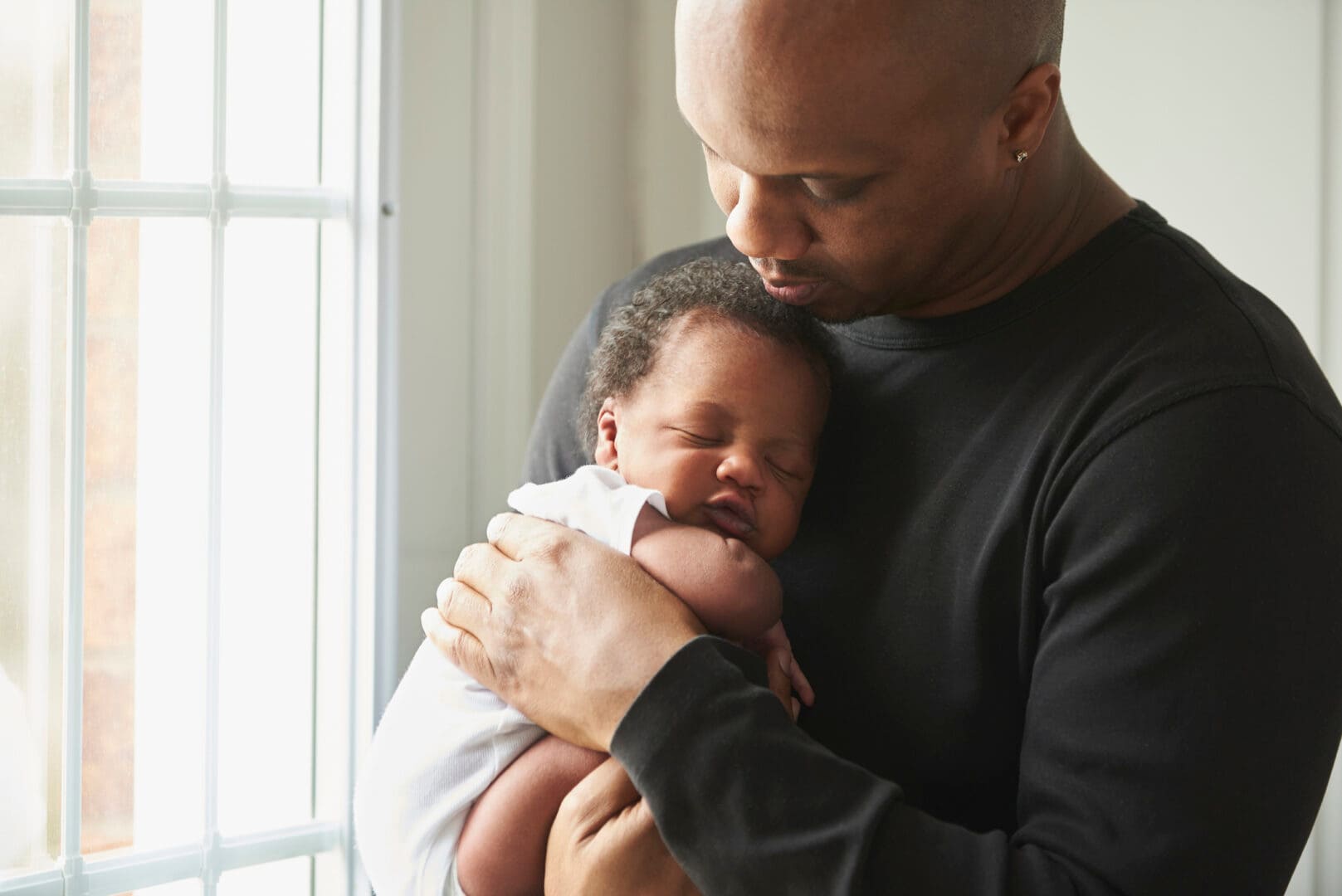Ask anyone with kids, and they’ll tell you: Parenting isn’t for the faint of heart. The sleepless nights, the added expenses and the inability to finish a sentence uninterrupted is tough sledding. But, just as women reap huge benefits from motherhood, being a father comes with science-backed perks, too.
“Becoming a father typically has a profound effect on a man in all sorts of ways, especially when it’s his first child,” says Lawrence R. Samuel, author of “American Fatherhood: A Cultural History.” “And many changes often begin before his female partner gives birth, making the idea of an ‘expectant’ father quite real.
Elizabeth Karberg, a fatherhood and child social development expert and social science research analyst at the Office of the Administration for Children & Families, adds that the shifts men undergo after becoming a father aren’t necessarily all that different from women’s. “Fathers are hard wired to be attached to their children and undergo similar emotional changes that mothers experience in pregnancy and after,” she explains.
Got kids? Then, FYI, you’re part superhero. Here are 10 benefits of being a father.
Key takeaways
- Fatherhood brings biological and emotional changes that strengthen bonding and reshape identity.
- It’s linked to health benefits, higher earnings and clearer life priorities.
- Despite challenges, it adds meaning and joy to life.
1. Your “bonding hormone” surges
A 2014 study of 88 heterosexual fathers found that, when their children were between the ages of 1 and 2, their testosterone — the hormone associated with aggression — dipped lower than non-fathers’. And on the flip side, their oxytocin — the hormone associated with parental attachment and general feelings of well-being — spiked. Similarly, a 2010 study found that gay dads generally had a better sense of well-being than childless gay men.
“Men undergo biological changes in pregnancy and early childhood that mirror similar hormonal and neuronal changes mothers undergo.”
— Elizabeth Karberg, fatherhood and child social development expert
“Men undergo biological changes in pregnancy and early childhood that mirror similar hormonal and neuronal changes mothers undergo — including an increase in oxytocin,” says Karberg. “This ‘bonding hormone’ rises in men throughout the first six months of fatherhood and it also increases in fathers after they play with their children.”
Karberg adds that, when there are barriers that prevent fathers from seeing their children, these biological changes may be blunted. “Giving fathers the opportunity — through paid leave or delegation of infant care responsibilities — to physically be with their child is important for these biological changes to occur that help them bond,” she says.
2. Your cardiovascular disease risk may be lowered
In what feels like a bit of a plot twist, a 2011 study found that men who fathered two or more children may have a decrease in their risk of cardiovascular disease (despite the increase in stress in parents).
Following men aged 50-71 with no prior cardiovascular disease for over 10 years, research found that married men over 50 with no kids were more likely to die of cardiovascular disease than married men over 50 with two or more children. “Fertility potential and reproductive fitness may reflect a man’s future health, given that over one-third of the male human genome is involved in reproduction,” the study authors wrote.
3. Your definition of “masculinity” evolves
It’s no secret that society has long perpetuated toxic masculinity — the idea that “manly” men are aggressive and dominating — but according to Samuel, having children can change men’s idea of what it means to be a man. “The process of becoming and then being a father dramatically transforms masculine identity,” he says. “As with mothers, a powerful caregiving and nurturing sensibility typically emerges to become an essential part of what it means to be a man. With fatherhood, the concept of ‘maleness’ is expanded as a host of positive humanistic values such as empathy, altruism and even morality become more pronounced.” Samuel goes on to say that a “shift in perspective and orientation also takes place upon becoming a dad.”
He says, “A macro or horizontal view of the world in which there are limitless opportunities contracts to one that is narrower and more vertical. This is a function of the perceived and no doubt instinctual need to protect and provide for one’s immediate family.”
4. Your salary might go up
While women may wind up making less after having children (a term sociologists have coined the “motherhood penalty”), some studies have found that men make more after becoming fathers. Research from the City University of New York found that, since 1990, on average, fathers in New York City have made more than their childless male counterparts.
Obviously, there are a number of variables to consider with this data: Do kids motivate men to make more for their family? Do wealthier folks decide to have kids? But either way, it’s a good thing, because kids are expensive.
5. You might step into a new role
Just as women find themselves in a new set of proverbial shoes after giving birth, men do as well — and in some ways, they get to figure out what this new role will entail.
“Men bond emotionally and psychologically with infants pre- and postnatally,” explains Mindy Scott, senior research scholar at Child Trends in Bethesda, Maryland who explains that the experience allows men, in turn, to establish their fatherhood identity and negotiate their role as a father/caregiver.
“After my first kid, everything was put in perspective and decision-making was much easier since I always put my family’s well-being first.”
— Jeff Wayland, dad of three in Cranford, New Jersey
6. You’ll gain clarity around your priorities
“Before kids, I had a hard time figuring out what was supposed to take precedence in my life,” says father of three, Jeff Wayland of Cranford, New Jersey. “But after my first kid, everything was put in perspective and decision-making was much easier since I always put my family’s well-being first.”
And it’s not just in Wayland’s head. Well, it is, actually. Brain scans have made it evident that, after they’ve become fathers, men’s priorities shift. In one study, MRI images showed that the reward-sensing part of the brain lit up in dads upon seeing photos of toddlers whereas that wasn’t the case with non-fathers. “Fathers exhibited increases in gray matter volume in several neural regions involved in parental motivation, including the hypothalamus, amygdala and striatum and lateral prefrontal cortex,” the study states. (So, yes, just like “mom brain,” “dad brain” is a real thing.)
These brain changes, according to Samuel, can also result in a “nesting instinct” for men. “Research has shown that although men do not become pregnant, there is a neurological, biological and almost metaphysical component attached to the process of becoming a father,” he explains. “Some of the physical symptoms of pregnancy can manifest in a dad-to-be, nature’s trick perhaps to remind a man that life as he knows it is about to radically change.”
7. Life has more meaning
According to Samuel, once a man becomes a father, a “wireless connection” develops between him and his child. “It’s a primal, brain chemistry-based means to establish a bond that will benefit the physical and psychic well-being of each,” he says, adding that such a bond has profound rewards.
“There are emotional gains to be had through the love of another human being, especially a family member, as a kind of transcendent synergy takes place in a relationship built on mutual trust and affection,” Samuel explains. “This indefinable feeling encompasses mind, body and spirit, making fatherhood an opportunity for a man to realize what it means to be more fully human.”
8. You’ll have more fun
Scientifically-proven? Not necessarily. But for some, being a father comes with an extra dose of fun. “There’s obviously a lot of stress that comes with being a dad, but I love getting to relive parts of my childhood with my kids or try new things with them,” says father of two Darren Fields of Los Angeles. “Trampoline parks, soccer games, camping in the backyard — come on, that’s just fun.”
It’s also worth noting that, while informally, dads are generally considered the “fun parent” in families, this phenomenon has also been scientifically-proven in a 2016 study. “Mothers … report less happiness, more stress and greater fatigue in time with children than do fathers,” the study authors conclude. “These gaps are relatively small and can be accounted for by differences in the activities that mothers and fathers engage in with children, whether other adults are present and the quality of their sleep and leisure.”
9. Your bad habits could fall to the wayside
Whether it’s chalked up to wanting to set a good example or wanting to live a longer life, research has found that some men are wont to ditch bad habits after fathering a child. A Oregon State University study published in 2011 reported that, after following over 200 at-risk boys for 19 years, there were “significant decreases in crime, tobacco and alcohol use” after men became fathers for the first time.
10. You’ll engage more with the world around you
“In general, being a father makes you feel more engaged in the world and committed to the future, as having a child inherently raises the stakes of life,” Samuel says. “For those men prepared to accept its many challenges, fatherhood offers significant meaning and purpose in life and represents a singular and rewarding experience.” Worth the sleepless nights? Definitely.





